Ten Highlights from IndieLisboa
 Thursday, May 11, 2023 at 12:00PM
Thursday, May 11, 2023 at 12:00PM 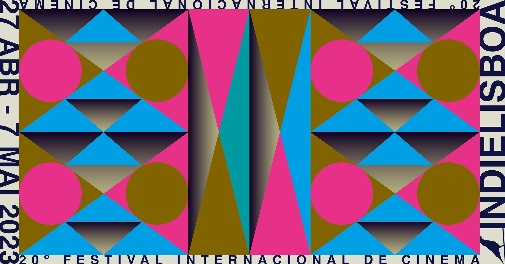
Dear reader, if you've noticed my relative absence in these early days of May, I can only apologize. I've been busy covering the 20th edition of the IndieLisboa film festival in the Portuguese capital. The event is a grand affair for the celebration of national and international independent cinema, with multiple competitive sections and prizes at the end of it all. This year's international competition winner was Juraj Lerotic's Safe Place, which I wrote about last year when reviewing various International Film Oscar submissions. Other titles should be less familiar to The Film Experience's readership, so this feels like an excellent opportunity to offer recommendations and spread the word on some nifty flicks.
From an out-of-focus Hong Sang-soo experiment to an extensive Jan Švankmajer retrospective, from shorts to features, a little over 300 films made up the festival's program. Having watched roughly a third of those, here are ten highlights…
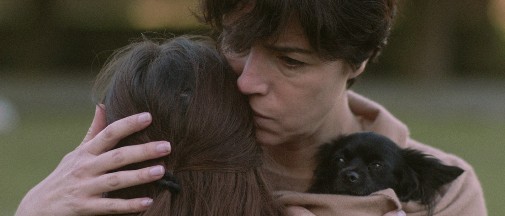
BAD LIVING/LIVING BAD, João Canijo
Presented as a conjoined diptych, Portuguese director João Canijo's latest project proved victorious (and controversial) in the festival's national competition. Mind you, this wasn't the biggest win in its repertoire since the first part, Bad Living, was awarded the Silver Bear by Kristen Stewart's Berlinale jury. That earlier passage considers the lives of five women working at a family-owned hotel somewhere on the northern Portuguese coast. As for the latter title, it depicts the same period from the guests' perspective, dividing itself into three parts, each loosely adapted from a different Strindberg story.
As one should surmise from the titles, Bad Living and Living Bad aren't joyful affairs. Instead, they're exploratory missions into the darkest depths of the human soul, with a particular emphasis on the broken relationships between mothers and daughters. Familial faultlines rule all, as does a sense of egotism and self-sabotage experienced by all characters, be they someone trapped in a well of bottomless depression or a monstrous manipulator who regards one's offspring as a vampire might look at their preferred victim. It's despairing stuff, sorrowful to the point of nihilism, a melodrama curdled into classic tragedy.
Though those latter words might sound like a dig, they are nothing of the sort. There's a rigor in the film's construction that subverts the possibility of exploitation. Much has to do with formalism, an overt focus on the narrative properties of sound design, and sharp cinematography keen on making the hotel a beautiful prison, a purgatory, an aquarium. However, like in most of Canijo's best films, the director's obsession with actors defines Bad Living and Living Bad. It's an actressexual feast of countless pleasures, with outstanding work from such Portuguese thespians as Anabela Moreira, Rita Blanco, Leonor Silveira, Beatriz Batarda, and many others. What a cast!
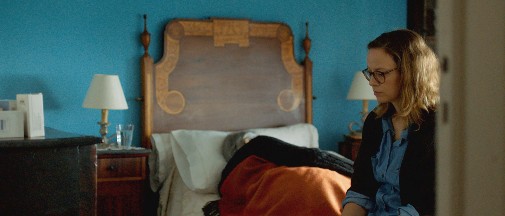
CIDADE RABAT, Susana Nobre
Though it never got the international acclaim it deserved, I am a great fan of Susana Nobre's previous feature Jack's Ride, which premiered at the 2021 IndieLisboa. Consequently, as I walked into her latest film, my mind reeled with great expectations, some met by Cidade Rabat, others skillfully sidestepped. Fiction born from non-fiction returns, though this time it comes with a memoirist twist as the director purloins personal history to flesh out her protagonist's plight. She's Helena, a producer who, early in the narrative, gets news of her mother's passing whilst working on a film set and soon begins dealing with that loss.
At first, the episodic feat of portraiture may seem trivial past an inspired prologue. Still, the accumulation of detail creates a sense of transient everyday poetry not unlike some of Chantal Akerman's best films.
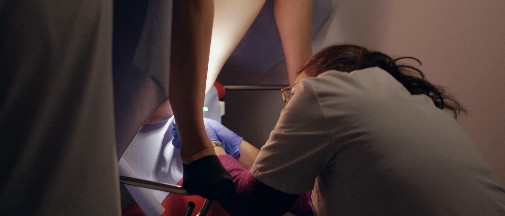
OUR BODY, Claire Simon
Despite Wiseman-esque rhythms and a fly-on-the-wall approach, Claire Simon's latest doc also involves a bit of authorial self-insert. Not that the French director ever tries to make the film about herself, positing the woman behind the camera as another in a vast tapestry of humanity coalescing at the obstetrics and gynecological ward at a hospital near Père-Lachaise. Through her and many others' cases, little fragments of otherwise unexplored lives, Simon meditates on the doctor-patient dynamic and what, at times, feels like the whole scope of the human experience as told through the organism's maladies.
Starting at the cemetery and ending in hope, the film's structure spans from teenagers to those on the precipice of death, some trying to be parents, others looking for the end of a pregnancy. It goes from the early days of transition to the seldom-seen reality of trans people reaching middle age and beyond. It's an epic, a testimony, a must-see film that arrives in American theaters later this year.
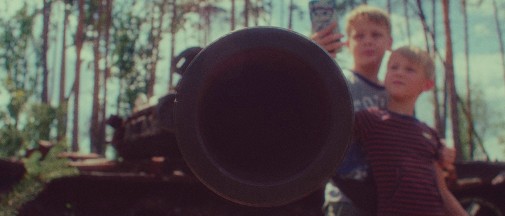
IN UKRAINE, Tomasz Wolski & Piotr Pawlus
The observational documentary can take many forms, encompassing various purposes within its model. Take the example of In Ukraine, a Polish production intent on shedding light on the everyday realities that don't appear on newscasts reporting the Russian invasion and the Ukrainian people's military resistance. Made up of sun-dappled vistas and fragmented bodies, either distant or too close to allow for individuality, the film is a collection of postcards where bucolic properties live hand-in-hand with the kind of scars one comes to expect from an active warzone.
Gorgeous widescreen shots incite awe at the visual beauty, while a calculated decontextualization asks us to consider the quotidian banality on the margins of horror. In absence, what mars the landscape, breaks, and ends lives, becomes an off-screen black hole whose gravitational pull is viscerally felt without the need for didacticism.

INCIDENT, Bill Morrison
While some filmmakers depict violence through its aftermath, finding potency in the void, others work in terms of immediacy and directness. Such is the case of Bill Morrison, whose latest short utilizes split-screen and a plethora of surveillance/bodycam footage to depict the police shooting of a Black man in Chicago, 2018. Unearthing his raw material from the public archive, the director creates a powerful experience that will leave you unnerved, outraged, seething with fury, and heartbroken just the same. We get to see the workings of automatic excuses and institutional coverup, the community's rage unraveling simultaneously to racist mindsets intent on rationalizing what happened.
It's not an easy film to watch, containing moments of real death, an insistent gaze upon the body that tempers the adrenaline, the picric actuality of life lost always at the forefront. However, it's an important film to watch, both as a piece of political art and a showcase for the power of editing, what it can do to the perception and processing of shock.
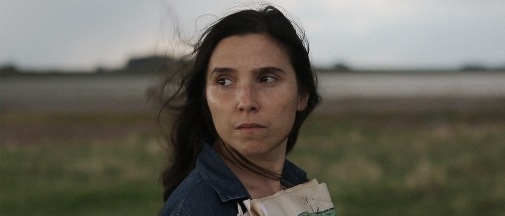
TRENQUE LAUQUEN, Laura Citarella
Compared to El Pampero Cine's thirteen-hour grand opus La Flor, the four-hour-plus Trenque Lauquen feels positively tiny, a trifle of a movie made by much of the same team and with a similar prodding of narrative cinema's shape-shifting faculties. Nevertheless, the tale of two men searching for a missing woman soon becomes a treatise on storytelling. It's also a keen dissection of the curiosity intrinsic to being alive, how a mystery can be a source of pleasure and purpose, sometimes a distraction but often a way of finding one's place in the world. Divided into two parts for more accessible theatrical presentation, the picture reveals a cosmic kaleidoscope hiding in plain sight.
As the curious woman turned into curiosity herself, a truth-seeker made to be the truth all others seek, Laura Paredes is as slippery as the film she co-wrote with director Laura Citarella. It's a character for the ages, though calling her something as simple as 'character' feels like a lie. Trenque Lauquen is too vast for such closed definitions. Trapped in eternal metamorphosis, the story of Laura will haunt you past the theater and into your dreams.
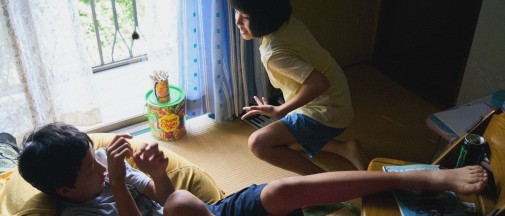
AMIKO, Yusuke Morii
Cinema has long commodified the notion of a dysfunctional family, finding luminous humor in the oddities of those bound by blood, by love. Sometimes, in shaping art out of complicated realities, their jagged facets smoothed in a gesture of unwitting simplification. Amiko repudiates that notion. Amiko is a film and a girl, the neurodivergent heroin of Natsuko Imamura's novella, thus turned into prickly cinema. It's a film that proposes hopeful defiance even as it wraps a merciless fist around the audience's heart, articulating the troubles of a family wracked by sorrows, gradually crumbling under the pressure of grief.
Finding someone to point an accusatory finger at in this story would be easy. However, it wouldn't be right or in concordance with the film. After all, Morii and his cast go to great extents to embody the frankness of their titular character, her desperate holding on to happiness as the world quietly burns. This means facile catharsis is denied, as are the narrative models that could have facilitated them, the formal tricks that could have forced a smile where none belongs. And so, honesty blossoms through Amiko, thorns and all, its roots as grounded in agony as in the occasional whimsy. An unconvincing "I'm fine!" shouted with a toothy smile is the perfect conclusion.
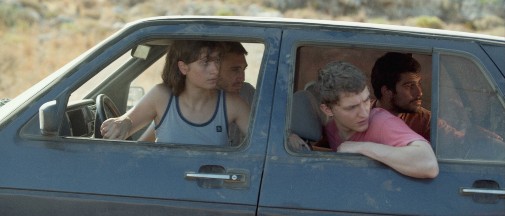
MUSIC, Angela Schenelec
Winner of the screenplay award from the latest Berlinale's main competition, Music represents an unorthodox spin on ancient myth. Modernizations are a dime a dozen since time immemorial, but few filmmakers have so skillfully used the properties of a mythological plot as Angela Schenelec. In her hands, the story of Oedipus becomes the basis unto which to build a cinematic edifice of sepulchral silences and oblique edits, an experience where form comes to the forefront alongside gestures, so simple yet so powerful. The scaffolding an often-told tale provides supports the experimentation, holding up the minimalist swerves with as much sturdiness as it sustains a rare grace.
Through this process of loose adaptation, the prominence of deviation is also exalted, resulting in passages that inspire confusion, beckon a surrender to the underlying emotions of the moving image. The advent of song is a reach towards the divine, perhaps an attempt at expressing what the cinematic device prevents in its adherence to monastic quiet. When it happens, it's beautiful, enrapturing in a way that only such austerity could inspire.
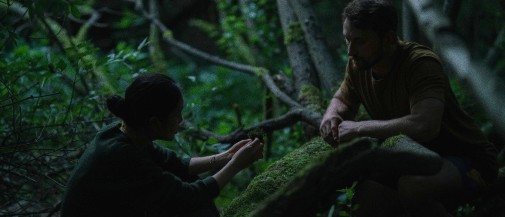
HERE, Bas Devos
As president of the Ghost Tropic fan club, I couldn't have been more excited to catch up with Bas Devos' sophomore feature. However, at the back of my head, the fear of disappointment made itself known. I had no reason to be worried, for Here is nearly as magical as its predecessor, making Brussels look like an urban garden where wandering souls seek their path and beautiful insomniacs make soup their love language. Once again, the Belgian capital shall be seen through the eyes of immigrant workers, though their stories couldn't be more different. Curiosity shall tie the loose threads in a tight knot, a paradox of cinematic imagination unbound.
Precise rhythms inspire a somnambulistic pace as if the screen were seducing us into its mysteries one gorgeous reticence at a time. Nothing is as enticing as moss, which will be our Rosetta Stone. Learn to recognize the complex forest contained within an inch of greenery, and you'll learn how to peruse the cinema of Bas Devos, where the everyday is a treasure trove of small miracles. They're sometimes the retelling of a dream bursting with gratitude or train history facts repeated in a game of telephone. It's the look of a handsome stranger caught in the rain, the kindness of an older sister with a Mona Lisa smile. It's the camaraderie of tired workers, the kiss of dawn upon the landscape, an empty fridge restocked for a final soup.
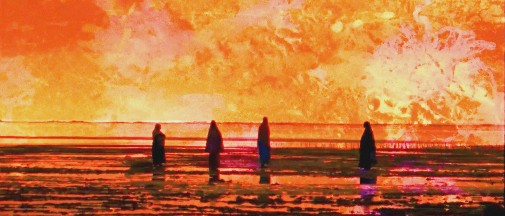
SAMSARA, Lois Patiño
By far, the most exciting discovery of IndieLisboa was this visual poem on matters of resurrection. Such was the surprise of its invention that I feel reluctant to spoil its secrets, finding that everyone should have an opportunity to confront the film's demands, its bold structural gambit, with an open mind. Go with Patiño into the unknown, the beyond, and welcome the sleep of death as it's offered. Let yourself be immersed. Let yourself die. So forth we go, with Samsara proposing an education and an experiment, an attempt at crystalizing the intangible in celluloid while honoring the wonder of our material world. Shot between Laos and Zanzibar by a team of intrepid cinematographers, it might also be the year's most splendorous film, palimpsestic editing patterns evoking sights so stunning they hurt. But oh, what sweet pain that is.
Which of these titles sparks more interest? Or have you seen some of them already?
 Amiko,
Amiko,  Bad Living,
Bad Living,  Cidade Rabat,
Cidade Rabat,  Here,
Here,  In Ukraine,
In Ukraine,  Incident,
Incident,  IndieLisboa,
IndieLisboa,  Music,
Music,  Our Body,
Our Body,  Samsara,
Samsara,  Trenque Lauquen,
Trenque Lauquen,  film festivals
film festivals 


Reader Comments (2)
Claudio, you have such a flair in writing your articles that it makes me want to try to find all of these films! Thanks for the suggestions!!
What I wouldn't give for a Jan Švankmajer retro on the big screen!
Love that the GHOST TROPIC director has a new film. Won't miss that on a big screen if possible. And that Bill Morrison sounds very interesting given that filmmaker. I have a screener of Trenque Lauquen to watch and am looking forward to sitting down to watch it eventually.